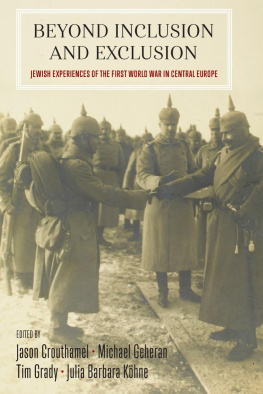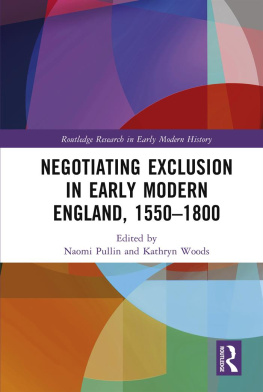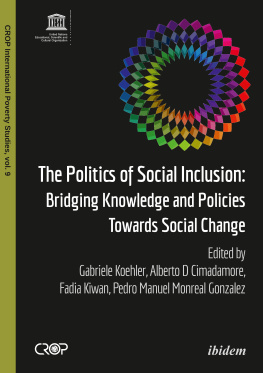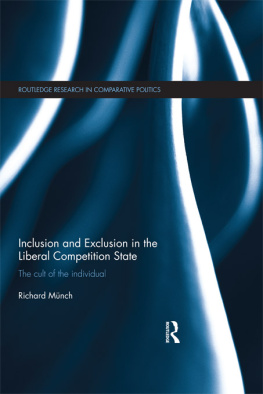BEYOND INCLUSION AND EXCLUSION
BEYOND INCLUSION AND EXCLUSION
Jewish Experiences of the First World War in Central Europe
Edited by Jason Crouthamel, Michael Geheran, Tim Grady, and Julia Barbara Khne
First published in 2019 by
Berghahn Books
www.berghahnbooks.com
2019 Jason Crouthamel, Michael Geheran, Tim Grady, and
Julia Barbara Khne
All rights reserved. Except for the quotation of short passages for the purposes of criticism and review, no part of this book may be reproduced in any form or by any means, electronic or mechanical, including photocopying, recording, or any information storage and retrieval system now known or to be invented, without written permission of the publisher.
Library of Congress Cataloging-in-Publication Data
Names: Crouthamel, Jason, editor. | Geheran, Michael, 1971 editor. | Grady, Tim (Timothy L.), editor. | Khne, Julia, editor.
Title: Beyond inclusion and exclusion : Jewish experiences of the First World War in Central Europe / edited by Jason Crouthamel, Michael Geheran, Tim Grady, and Julia Barbara Khne.
Description: First edition. | New York ; Oxford : Berghahn Books, 2019. | Includes bibliographical references and index.
Identifiers: LCCN 2018026306 (print) | LCCN 2018028774 (ebook) | ISBN 9781789200195 (ebook) | ISBN 9781789200188 (hardback : alk. paper)
Subjects: LCSH: World War, 1914-1918--Jews--Europe, Central. | World War, 19141918--Participation, Jewish. | Jews--Europe, Central--History--20th century. | World War, 1914-1918--Social aspects--Europe, Central. | Europe, Central--Ethnic relations--History--20th century.
Classification: LCC D639.J4 (ebook) | LCC D639.J4 B49 2019 (print) | DDC 940.3/143089924--dc23
LC record available at https://lccn.loc.gov/2018026306
British Library Cataloguing in Publication Data
A catalogue record for this book is available from the British Library
ISBN 978-1-78920-018-8 hardback
ISBN 978-1-78920-019-5 ebook
Contents
Jason Crouthamel, Michael Geheran, Tim Grady, and Julia Barbara Khne
Christine G. Krger
Tamara Scheer
Devlin M. Scofield
Michael Geheran
Sarah Panter
Andrea A. Sinn
Sabine Hank
Jason Crouthamel
Philipp Stiasny
Glenda Abramson
Julia Barbara Khne
Florian Brckner
Derek Jonathan Penslar
Figures and Tables
Figures
.
.
.
.
.
.
.
.
.
.
.
.
.
.
.
.
.
.
.
.
.
.
.
.
.
Tables
.
.
.
Acknowledgments
This volume is the result of a sustained collaborative effort over several years. The inspiration originally came from a 2015 conference panel on Jewish soldiers during World War I, in which three of this volumes contributors participated. We are grateful to the participants, audience members, and commentator whose critical input inspired us to expand our project beyond German-Jewish soldiers and ex-servicemen, and to consider more broadly the diverse range of experiences of Central European Jewry during the Great War as a whole.
We owe a debt of gratitude to the authors of this volume, whose enthusiasm and abiding commitment to the project carried it over the finish line. Editing a book with authors from across Europe and the United States was a daunting enterprise, but our team of contributors have not only made our task intellectually rewarding, but also an unusually pleasant one.
We are also enormously grateful to our editorial team at Berghahn Booksnotably Chris Chappellfor the enthusiasm with which they have seen the book through from conception to publication. Two anonymous reviewers provided critical input and we thank them for their helpful comments. In the end, we could not have hoped for a smoother review and production process.
INTRODUCTION
Jason Crouthamel, Michael Geheran, Tim Grady, and Julia Barbara Khne
On the eve of the First World War, the German Jewish Marcuse family gave the outward impression of leading a very comfortable middleclass existence. Thirty-eight-year-old Harry Marcusea medical doctor by professionlived with his wife Mimi and two young daughters in Berlin. The start of armed hostilities in August 1914, however, tore their lives asunder. Harry departed for the Eastern Front, where his medical training was urgently needed. Meanwhile, his brother Josef headed in the opposite direction to serve with a cavalry battalion on the Western Front. Alone with two small children, Mimi moved to be near her parents in Teplice, then part of the Austro-Hungarian Empire. There, she managed to squeeze in time to help in a soup kitchen as well as with the Red Cross. Sadly, as it turned out, she was also well-positioned to provide her parents with emotional support. During the first winter of the war, Mimis brother Paul vanished in the East, presumed captured, though he was never seen again. Another brother, Hans, failed to recover fully from typhoid fever and took his own life in 1917.1
The Marcuses path through the First World War was remarkably varied. Family members were strewn across France, Germany, Austria-Hungary, and Russia, where their daily routines ranged from serving at the front lines, tending the wounded orin the case of Mimi Marcusecaring for the family and household. Irrespective of their own wartime role, loss and grief touched all in equal measure, the deaths of the two brothers, Hans and Paul, being most deeply felt. It is the sheer diversity of Jewish wartime experiences, as encapsulated by the Marcuse family, that lies at the very heart of this volume. Its central argument is that historians cannot interpret a singular Jewish war experience solely through the dynamics of antisemitism and Jewish identity, which could be a category of self-designation and self-perception ascribed from within, or a category ascribed from outsiderelated to religion, heredity, or race. Jewishness and antisemitism as such need to be understood as heterogenous, manifold, highly debated, and historically versatile categories. Central European Jewish experiences were diverse, and fragmented along gender, political, geographic, social, and subjective lines. In short, there was no single Jewish experience of the First World War that could be addressed as an empirical, epistemic, or theoretical entity.
The widest divergence surely occurred between those in the military and those at home, but even here the diversity of experience was wide. In total, some 100,000 Jews served in the German military, though of course not all were at the forward lines.2 Some German Jews ended up in administrative roles, others in medical or garrison-based jobs. While most military-aged Jewish men were drafted into the army, it also needs to be stressed that German Jews served in the Imperial Navy and in the new German air force as well. The number of Jews fighting in the Austro-Hungarian army was much higher, with more than 300,000 men conscripted during the course of the First World War. The Habsburg Empire was also far more amenable to the idea of Jewish officers. By 1900, about 18 percent of the reserve officer corps consisted of Jews. In Germany, by stark contrast, the doors to the officer corps only started to slowly open during the war. Prior to the conflict, no more than a handful of Jewish officers had been commissioned, and these had all been in the Bavarian army.3







